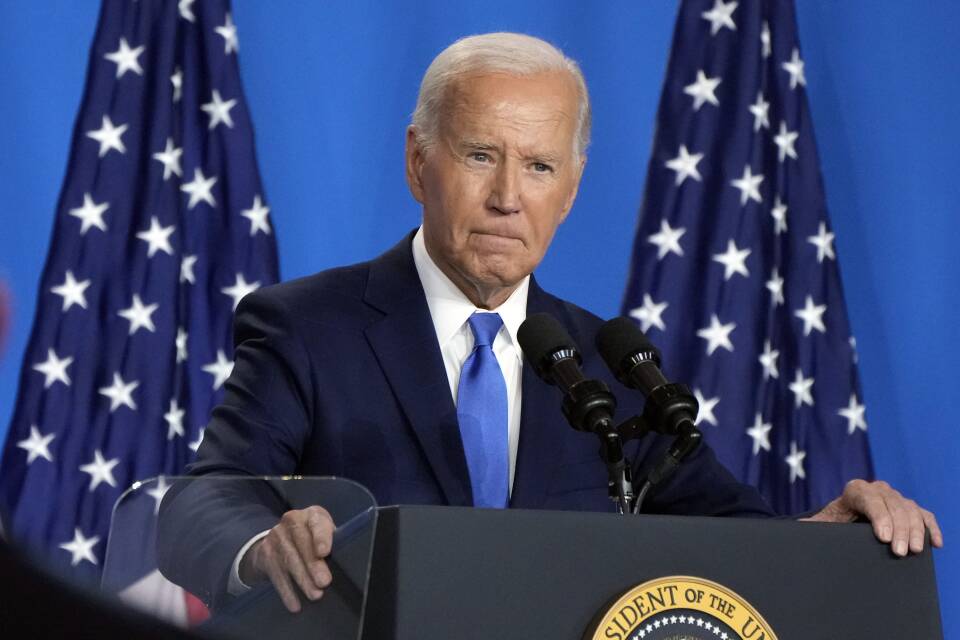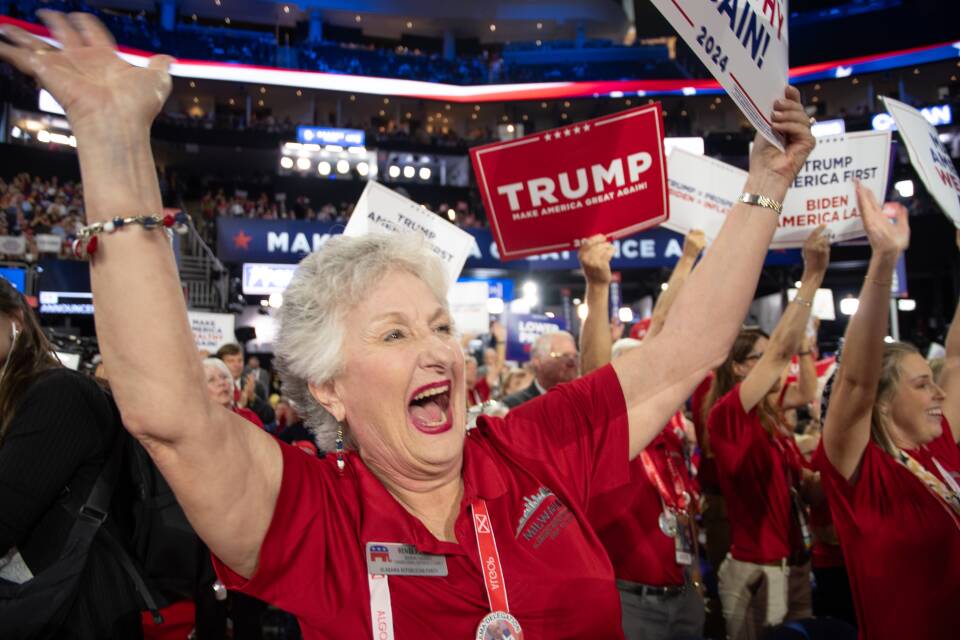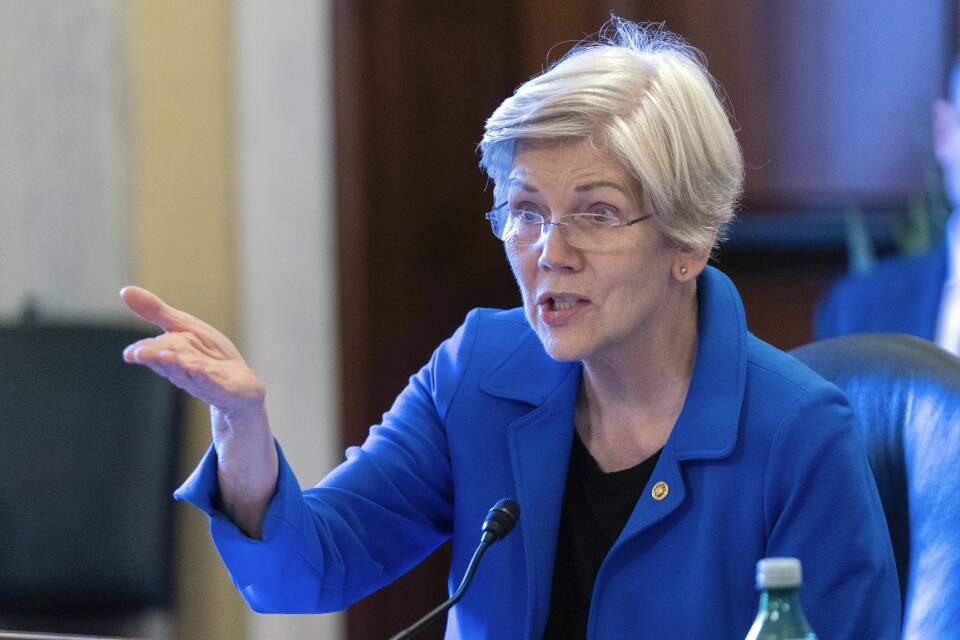Jeremy Siegel: This is GBH’s Morning Edition. Democrats around the country appear to be falling in line behind Vice President Kamala Harris after President Biden’s decision to step down as the Democratic nominee. Several state delegations for the DNC have already pledged unanimous support to Harris, including New Hampshire’s, but Massachusetts has not yet.
Paris Alston: For more on this and how the weekend shake-up is making waves in local politics, we’re joined now by GBH political reporter Adam Riley and UMass Boston political science professor Erin O’Brien. Good morning to you both.
Prof. Erin O’Brien: Good morning.
Adam Riley: Morning, you two.
Siegel: So, Adam, we’ve heard from some state leaders this morning. How would you characterize the response we’ve seen in Massachusetts so far?
Riley: So far, what I have seen from our big political names is a desire to praise President Biden’s record, a desire to frame his decision not to seek a second term as a kind of commendable moral act in and of itself — one that testifies to, as these Democrats would put it, his excellence of character. And then a real rush to get behind Kamala Harris as the nominee in waiting, following the president’s lead. That seems to me to be more or less what we’ve heard from all the members of the delegation [and] Governor Maura Healey. There’s variations on those themes. Some people will accentuate certain parts more than others, but that’s the pattern that I’ve discerned now.
Alston: Erin, the vice president is no stranger to Massachusetts. She’s been here for a number of campaign events, the most recent among them being a big Democratic fundraiser in Provincetown. And she also attended the NAACP convention in Boston last year, where I, along with my GBH colleague Jim Braude, were able to speak with her. And I asked her how this changing city of Boston fits into the current civil rights landscape.
Vice President Kamala Harris: The moment that we are in in our country is that I believe there is a full on attack against hard-won, hard-fought rights and freedoms. And this is a moment in time that we need to recognize that that is, in fact, taking place, and then do what we must to renew ourselves to the work that took place here in Boston those many years ago.
Alston: Now we know that Massachusetts traditionally goes blue, Erin, but she wasn’t even on the Democratic primary ballot in 2020. So given how the electorate is changing, what role will the Commonwealth play in this race?
O’Brien: Money, money, money.
Alston: It’s always the motivation.
O’Brien: Yes, indeed. I’ve long thought it would be great to have a tracker between the number of public events that candidates do in Massachusetts and the number of fundraisers, because Massachusetts is a wealthy state. As you said, it’s a deep blue state. And so Democratic presidential candidates come to Massachusetts because our pockets are relatively deep. And I think what you heard in that clip is what a lot of Massachusetts Democrats and Democrats elsewhere wanted to hear from the Biden-Harris ticket: That this is an assault on rights of marginalized communities. Donald Trump is a fear. He’s a driving force in that. And Kamala Harris in that clip was able to articulate something that Democrats wanted to hear from Joe Biden. But he just proved, despite all the accolades that Adam rightfully just noted, he just proved himself unable to do this campaign cycle.
Siegel: Beyond money and campaigning, Erin, Harris could make history here. If she were to win, she would be the first woman, first African American woman and first South Asian American in the Oval Office. Do you think America is ready to make that history? We’ve heard from some voters with reaction to the news from President Biden and Harris being lifted as the potential next nominee that we’re not ready to elect a woman president.
O’Brien: You know, I’ve taught women in politics since I started my career, which is about 20 years long. And I would say that Harris needs to make America ready. We know that male independent voters, when there’s equally qualified male and female candidates, tend to give the male the advantage by about 3%. So that’s why individuals are worried about Pennsylvania, Wisconsin, Michigan, those Rust Belt swing states. But, you know, Barack Obama, obviously not a female, was elected as an individual of color. So I think it’s not whether America is ready. It’s whether this campaign can turn out voters who are ready. So it’s an ongoing game.
Riley: Just to add to what Erin said, one advantage that Harris is going to have is now she is the young candidate in the race, right? The line of attack that Republicans were directing at President Biden for months has now become impossible to deploy. So she has a chance to cast herself as the youthful candidate, the more vigorous candidate, the more lucid candidate in comparison with Donald Trump. And then, of course, there’s the running mate question, too. And I think, as other people have observed, there’s little doubt that you’re going to see Harris go with a white male as her running mate. That’s going to be, I think, a very important pick, an especially important pick in this race.
Alston: Adam, do you have any insights on who that could be, exactly?
Riley: I mean, help me out here. We’ve got Andy Beshear from Kentucky. Josh Shapiro from Pennsylvania. Who else are we looking at?
O’Brien: [Roy Cooper,] governor, from North Carolina, who she seems to get along with. And, you know, the outsider, Big Gretch, [Michigan Gov. Gretchen Whitmer]. But it’s unlikely that there will be two women.
Riley: Yeah. Agreed.
Alston: I’m also I also want to note, you know, there has been energy around women taking the Oval Office. Even close, but no cigar, right? We’ve had former U.N. Ambassador Nikki Haley, who fell quite short on the Republican side. But we also had Massachusetts Senator Elizabeth Warren in 2021, who more was able to garner a lot of energy. But, Adam, from a procedural standpoint, I mean, there’s a lot that the Democrats have to figure out at this point. The Massachusetts delegates are meeting tonight. Harris is not the definite nominee yet, but there’s not a lot of time. So how does the process go?
Riley: That is a huge question. And when I was asking members of the delegation yesterday, they were not able to give specifics. People agreed — and, you know, people, like I said, seem to be falling in line behind Harris. I’m not sure if it’s unanimous yet, but I think it’s going to end up there if it isn’t officially there at this point. But when you ask people what the process should be, they say it should be an open process, that Harris should not be effectively given the job and a coronation. But the specific mechanics, they are less able and willing to talk about. I think probably what we’re going to see, and I’d be interested in Erin’s take on this, I think probably what we’ll see is it’ll just be hashed out at the convention, with delegates saying who they are behind. And I think by the time we get to that point, feel free to save this audio, play it if I’m wrong in the future. But I think by the time we get to the convention, we’re going to have a pretty good sense. You know, even well before the convention, we’ll have a pretty good sense of whether anyone is going to give Harris a run for her money, or whether the job is just hers and the convention is a formality.
Siegel: Erin, in the minute that we have left, what will you be watching for going into the convention in the weeks ahead before the general election?
O’Brien: Well, first thing I’m going to look for is, did they do the roll call before? Remember, some states like Ohio have earlier filing deadlines, so there might be a virtual roll call. That virtual roll call would go to like the 4,500 or so delegates, most of whom are Biden delegates already. And I think that’s a real advantage for Harris, because it would mean, you know, I at least have a romantic view of on the convention floor, everyone’s being politicked and, you know, bring the cigars back and all that. But that — we’ve all been on Zoom calls. Imagine trying to have a conversation and sidebar conversations with 4,700 people. So I think the virtual roll call and its necessity because of the early ballots helps Harris’s cause considerably.
Siegel: That was GBH politics reporter Adam Riley and Professor Erin O’Brien of UMass Boston. Thank you so much to both of you.
O’Brien: Thank you.
Riley: Back at you.
Alston: And to our listeners, stay tuned. Later today on GBH, you will be able to hear more of that interview with Vice President Kamala Harris, alongside Boston Public Radio’s Jim Braude. That, plus analysis of the race begins at 11 a.m. here on GBH. You are listening to GBH News.
President Joe Biden’s decision Sunday to end his reelection bid drew fulsome praise from some of the biggest names in Massachusetts’ Democrat-dominated political landscape.
Gov. Maura Healey — the first Democratic governor to suggest that Biden reconsider his bid against former President Donald Trump — lauded Biden’s legacy in existential terms in a statement she released about half an hour after the president’s announcement.
“Joe Biden ran for President to restore the soul of our country and defeat the greatest threat our democracy has ever seen,” Healey wrote. “And that’s exactly what he did.”
After offering additional praise of Biden’s record as president, Healey described his decision to cease seeking reelection as a testament to his character.
“President Biden’s decision today not to seek reelection is the ultimate example of putting the country first — something Joe Biden has done over and over again in his unparalleled career,” Healey added.
U.S. Rep. Jake Auchincloss, who had also urged Biden to reconsider his reelection bid, told GBH News that Biden’s decision created a striking contrast with Trump.
“Joe Biden is ceding power because he thinks it’s in the best interest of the United States,” Auchincloss said. “Donald Trump clung on to power despite losing an election, inciting an insurrection ... all because he could not tolerate putting country ahead of self.”
U.S. Rep. Seth Moulton, who was the only member of the Massachusetts delegation to unequivocally say Biden should end his campaign, told GBH News that the president’s decision is “the right thing for the country.” Moulton was enthusiastic as he discussed the electoral implications of Biden’s exit and endorsement of Vice President Kamala Harris.
“I’m proud of the president,” Moulton said. “I’m excited to endorse the vice president. I think she’s going to take the fight to Donald Trump, and has given us a strong chance of winning in a race between a vision for the future under Kamala Harris and a dark vision for a second Trump term with Donald Trump.”
Several other members of the Massachusetts delegation have indicated they are endorsing Harris, including Auchincloss, Sen. Elizabeth Warren, Sen. Ed Markey, Rep. Jim McGovern, Rep. Lori Trahan, and Rep. Ayanna Pressley, who posted a photo on X of her and Harris standing on a stage together, clasping each other’s hands and smiling.
”@KamalaHarris I’m all in, let’s go,“ Pressley wrote, adding the hashtag #BlackWomenLead.
Also on X, Warren called Harris a ”proven fighter“ with a track record of protecting consumers and fighting for abortion rights.
”We have many talented people in our party, but Vice President Harris is the person who was chosen by the voters to succeed Joe Biden if needed,“ Warren wrote. ”She can unite our party, take on Donald Trump, and win in November.“
Warren praised Biden’s decision as ”selfless“ and a ”profound gift to the people of the United States,“ and said the president had ”accomplished more in the past four years ... than we have been able to get done in the last forty.“
Markey used a post on X to offer a briefer, more personal reflection.
”From reunifying NATO, to passing the largest climate investment in our history, President Joe Biden has helped save democracy and the planet,“ Markey wrote. ”He has a record unmatched in modern U.S. history, and I am forever grateful for his service and friendship.“
Biden’s decision also elicited praise from McGovern, Trahan, and Democratic Whip Katherine Clark.
The Massachusetts Republican Party was less impressed by Biden’s announcement, however. In a statement to GBH News, chair Amy Carnevale said: ”No matter the nominee, Americans now see through the failed policies of the Democratic Party ... Americans want a shift, and we’re confident that no Democrat will measure up to the Republican ticket.“
Mass. GOP executive director John Milligan said that, by stepping down, Biden was undercutting the voters who made him the party’s presumptive nominee.
”I think the biggest thing is that we’ve been hearing for eight years now that from the Democratic Party that President Trump is a threat to our democracy and our democratic process, and today the Democratic Party threw the democratic process out the window,“ Milligan told GBH News.










